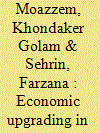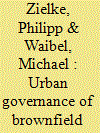|
|
|
Sort Order |
|
|
|
Items / Page
|
|
|
|
|
|
|
| Srl | Item |
| 1 |
ID:
143529


|
|
|
|
|
| Summary/Abstract |
Bangladesh’s success in the global apparel value chain following the expiration of the Multi-Fibre Arrangement in 2005 deserves study to understand how a least developed country can become a major source of apparels within a short period of time. This article shows that even under a quasi-hierarchical governance structure, suppliers in Bangladesh have made significant progress in economic upgrading, particularly process and product upgrading. Competitive pressure linked to the ‘open sourcing’ of apparels has caused leading firms to ease conditionalities on the production process. Preferential access to major markets, timely responses to buyers’ changing demands, favourable policies related to the import of raw materials, production and export of apparels and new labour-related policies have facilitated economic upgrading. Suppliers have accordingly benefited from substantial investment in productive capacity, technological know-how and workers’ skills. Further upgrading would require more investment in firm-level productivity and improvement in physical and social compliance.
|
|
|
|
|
|
|
|
|
|
|
|
|
|
|
|
| 2 |
ID:
170980


|
|
|
|
|
| Summary/Abstract |
The article investigates whether and how economic upgrading leads to social upgrading for rural migrant workers (RMWs) in the Pearl River Delta (PRD) region of China. Two cities that represent different types of economic upgrading in the PRD, namely Shenzhen and Foshan, were selected as the investigation sites. The data were mainly obtained from statistical yearbooks and interviews with 72 informants, including RMWs, scholars, employers, and officials. The article argues that two types of economic upgrading, namely reindustrialization and tertiarization, affect the social upgrading of RMWs in different ways. However, both types of economic upgrading have caused a pushing-out effect by increasing unemployment or working intensity and living costs.
|
|
|
|
|
|
|
|
|
|
|
|
|
|
|
|
| 3 |
ID:
144847


|
|
|
|
|
| Summary/Abstract |
Over the past several years, the creative reuse of brownfields has played a major role in Chinese cities to give their urban landscape a so-called second development. This paper analyses the governance of the brownfield restructuring in Guangzhou (Canton). The research is based on a study of the T.I.T Creative Industry Zone, a highly successful creative space currently in danger of demolition. This paper follows DiGaetano and Strom's (2003) analytical governance framework. This approach allows for deciphering the complexities of decision-making through a well-structured set of interdependent categories. In Guangzhou, new policies and institutions have been promoting the restructuring and have contributed to the formalisation of public–private interactions. In general, this indicates a shift towards a more corporatist governance. However, the study of T.I.T reveals a rather intricate picture: the policymaking remains influenced by a top-down authoritative style – sometimes in an arbitrary manner – and to some extent also by particularistic exchanges. This indicates a complex mode of urban governance consisting of increasingly corporatist elements but still with managerial, and to a lesser extent, clientelistic elements. Finally, the coexistence of different governance modes seems to be a typical outcome of China's transition while still remaining more adaptive, experimental and flexible in nature.
|
|
|
|
|
|
|
|
|
|
|
|
|
|
|
|
|
|
|
|
|